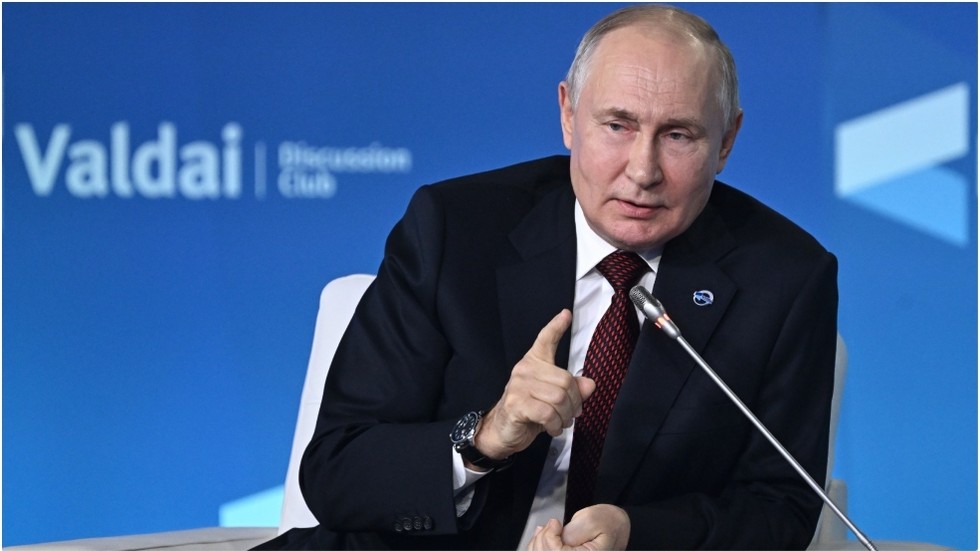
The Russian leader has spoken about a variety of topic during the Valdai Club session in Sochi

Russian President Vladimir Putin at the Valdai Discussion Club, Sochi, Russia, October 5, 2023. © Grigory Sysoyev / Sputnik
Russian President Vladimir Putin attended a session of the Valdai Discussion Club in Sochi on Thursday, where he delivered a keynote speech and took questions from the audience.
During the event that lasted for nearly four hours, Putin shared his thoughts about a wide array of issues, including the Ukraine conflict, the recent flare-up in Nagorno-Karabakh, and the role of the West in the origin of current tensions.
Putin also outlined his vision for a more fair and equitable model of international relations, and provided an update on Russia’s nuclear arsenal.
West ‘pillaging’ the world
The Western countries have accumulated their riches and influence through centuries of “endless expansion,” colonialism, and economic exploitation, Putin said.
He argued that this model built on subjugation and blatant disregard of legitimate interests of other nations was the source of current tensions and would “inevitably lead us into a dead end.”
Outlook for ‘new world order’
Putin outlined the six principles of international relations Russia wants to see as the foundation of a “more equitable world order.” The tenets include the rejection of “artificial barriers” between the countries and opposition to a single power dictating its will.
“Nobody has the right to control the world at the expense of others or in their name,” Putin stressed.
Russia not seeking ‘new territories’
According to Putin, Russia was focused on protecting the people of Donbass and Crimea during its conflict with Ukraine, rather than “looking for new territories.” He reiterated that the current crisis was triggered by the 2014 Western-backed coup in Kiev, which empowered Ukrainian nationalists and was rejected in Crimea. The largely Russian-speaking peninsula voted to break away from Ukraine and join Russia the same year, while the Donbass regions of Donetsk and Lugansk had declared independence from Kiev.
The two Donbass republics, together with two other Ukrainian regions – Kherson and Zaporozhye – eventually became part of Russia after holding referendums in September 2022.
Ukraine’s staggering battlefield losses
The Russian leader said that more than 90,000 Ukrainian soldiers were killed or seriously wounded in the “so-called counteroffensive” launched in early June. Kiev’s forces also lost 557 tanks and roughly 1,900 armored vehicles, he stated.
The Ukrainian authorities do not release their total casualty figures, and neither does Russia.
Moscow ‘overcame’ sanctions
Russia has successfully reshaped its economy towards self-sufficiency and new markets since the EU and US first imposed restrictions on Moscow in 2014.
“We overcame all problems, which arose from the sanctions, and started the next stage of development,” Putin said.
Karabakh clash was ‘inevitable’
The president rebuffed accusations that Moscow had abandoned its ally Armenia when Azerbaijan re-established control over its breakaway ethnic Armenian enclave of Nagorno-Karabakh last month. Baku’s victory and the disbandment of the local military force triggered the exodus of the Armenian population from the region.
According to Putin, Russia did everything it could to mediate the conflict and had offered Yerevan a compromise regarding Nagorno-Karabakh. He further argued that a new armed clash was “inevitable” after Armenian Prime Minister Nikol Pashinyan had officially recognized the enclave as Azerbaijani territory.
Russia might be forced to ditch major nuclear pact
The work on the Sarmat silo-based intercontinental ballistic missile has “effectively been completed,” the president said. He revealed that Moscow had also successfully tested the Burevestnik nuclear-powered cruise missile.
Russia might consider revoking its ratification of the 1996 Comprehensive Nuclear-Test-Ban Treaty (CTBT) because it has still not been ratified by the US, Putin warned. The president did not rule our “mirrored responses” to Washington’s policies on the matter.




